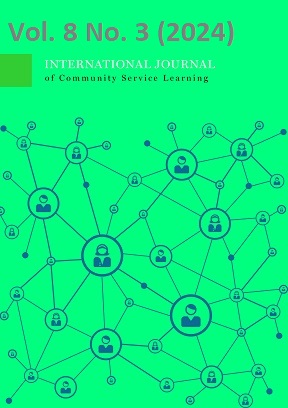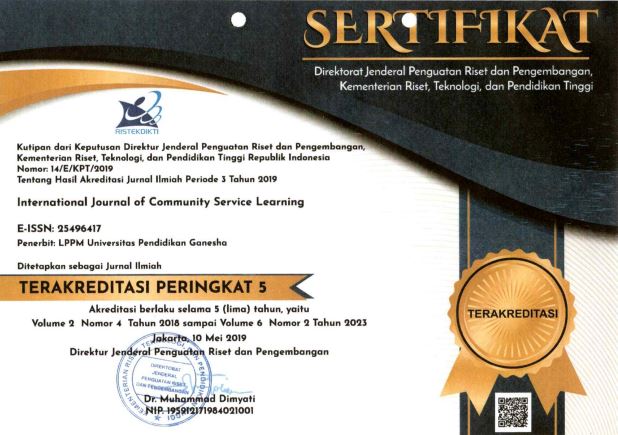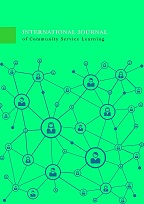Empowering Special Needs Children: Community Outreach for Inclusive Mathematics Education
DOI:
https://doi.org/10.23887/ijcsl.v8i3.80816Keywords:
Mathematics, Mentoring, Students with Special NeedsAbstract
This study is motivated by the low quality of mathematics learning for students with special needs caused by the need for teaching materials tailored to their needs and the limitations of teachers in using inclusive learning strategies. This study aims to analyze the effectiveness of a community service initiative designed to improve mathematics learning for students with special needs in SLB. This study used a developmental research method with a pretest-posttest design on one group of research subjects, involving teachers and students with special needs as test subjects. The program involved 20 students and 4 teachers. The results show the initiative's effectiveness in improving math education for special needs students. Data collection was conducted through observation, interviews, and questionnaires, while the instruments used included observation guidelines, interview sheets, and questionnaires for teachers and students. The collected data were analyzed using qualitative descriptive analysis techniques and paired t-tests to measure changes in teachers' understanding and skills and improvements in students' motivation and learning outcomes. This study concludes that inclusive education interventions based on special learning aids effectively overcome learning barriers for students with special needs. The implication of this study is the need for further development in teacher training and the provision of specialized teaching materials to support inclusive education in all schools.
References
Aprilia, R. (2020). Does metacognition matter in the relationship between mathematics interest and mathematics anxiety? Elementary Education Online, 19(4), 2396–2407. https://doi.org/10.17051/ilkonline.2020.764416.
Attard, C., & Holmes, K. (2022). An exploration of teacher and student perceptions of blended learning in four secondary mathematics classrooms. Mathematics Education Research Journal, 34(4), 719–740. https://doi.org/10.1007/s13394-020-00359-2.
Bishara, S., & Kaplan, S. (2022). Inhibitory Control, Self-Efficacy, and Mathematics Achievements in Students with Learning Disabilities. International Journal of Disability, Development and Education, 69(3), 868–887. https://doi.org/10.1080/1034912X.2021.1925878.
Brundiers, K., Barth, M., Cebrián, G., Cohen, M., Diaz, L., Doucette-Remington, S., Dripps, W., Habron, G., Harré, N., Jarchow, M., Losch, K., Michel, J., Mochizuki, Y., Rieckmann, M., Parnell, R., Walker, P., & Zint, M. (2021). Key competencies in sustainability in higher education—toward an agreed-upon reference framework. Sustainability Science, 16(1), 13–29. https://doi.org/10.1007/s11625-020-00838-2.
Carpenter, J. (2019). Domain-general enhancements of metacognitive ability through adaptive training. Journal of Experimental Psychology: General, 148(1), 51–64. https://doi.org/10.1037/xge00005.
Cheng, S.-C., & Lai, C.-L. (2020). Facilitating learning for students with special needs: a review of technology-supported special education studies. Journal of Computers in Education, 7(2), 131–153. https://doi.org/10.1007/s40692-019-00150-8
del Pozo-Armentia, D. R., & Cantero, F. G. (2020). The pedagogical limitations of inclusive education. Educational Philosophy and Theory, 52(10), 1064–1076. https://doi.org/10.1080/00131857.
Dewsbury, B. (2019). Inclusive teaching. CBE Life Sciences Education, 18(2). https://doi.org/10.1187/cbe.19.
Dong, A., Jong, M. S. Y., & King, R. B. (2020). How Does Prior Knowledge Influence Learning Engagement? The Mediating Roles of Cognitive Load and Help-Seeking. Frontiers in Psychology, 11(October), 1–10. https://doi.org/10.3389/fpsyg.2020.591203.
El-Sabagh, H. A. (2021). Adaptive e-learning environment based on learning styles and its impact on development students’ engagement. International Journal of Educational Technology in Higher Education, 18(1), 53. https://doi.org/10.1186/s41239-021-00289-4.
Ginja, T. G., & Chen, X. (2020). Teacher educators’ perspectives and experiences towards differentiated instruction. International Journal of Instruction, 13(4), 781–798. https://doi.org/10.29333/iji.2020.13448a.
Huang, X. (2019). Impact of math self-efficacy, math anxiety, and growth mindset on math and science career interest for middle school students: the gender moderating effect. European Journal of Psychology of Education, 34(3), 621–640. https://doi.org/10.1007/s10212-018-0403-z.
Jimenez, B. A., & Besaw, J. (2020). Building Early Numeracy through Virtual Manipulatives for Students with Intellectual Disability and Autism. Education and Training in Autism and Developmental Disabilities, 55(1), 28–44. https://www.jstor.org/stable/26898712.
Kauffman, J. M., & Hornby, G. (2020). Inclusive vision versus special education reality. Education Sciences, 10(9), 1–13. https://doi.org/10.3390/educsci10090258.
Klang, N., Karlsson, N., Kilborn, W., Eriksson, P., & Karlberg, M. (2021). Mathematical Problem-Solving Through Cooperative Learning—The Importance of Peer Acceptance and Friendships. Frontiers in Education, 6(August), 1–10. https://doi.org/10.3389/feduc.2021.710296.
Langdon, C., Kurz, C., & Coppola, M. (2023). The Importance of Early Number Concepts for Learning Mathematics in Deaf and Hard of Hearing Children. Perspectives on Early Childhood Psychology and Education, 5(2). https://doi.org/10.58948/2834-8257.1061.
Lin, P. S., & Kennette, L. N. (2022). Creating an Inclusive Learning Community to Better Serve Minority Students. Journal of Effective Teaching in Higher Education, 4(3), 1–18. https://doi.org/10.36021/jethe.v4i3.250.
Magableh, I. S. I., & Abdullah, A. (2020). On the effectiveness of differentiated instruction in the enhancement of jordanian students’ overall achievement. International Journal of Instruction, 13(2), 533–548. https://doi.org/10.29333/iji.2020.13237a.
Molina Roldán, S., Marauri, J., Aubert, A., & Flecha, R. (2021). How Inclusive Interactive Learning Environments Benefit Students Without Special Needs. Frontiers in Psychology, 12(April). https://doi.org/10.3389/fpsyg.2021.661427.
O’Leary, E. S., Shapiro, C., Toma, S., Sayson, H. W., Levis-Fitzgerald, M., Johnson, T., & Sork, V. L. (2020). Creating inclusive classrooms by engaging STEM faculty in culturally responsive teaching workshops. International Journal of STEM Education, 7(1), 32. https://doi.org/10.1186/s40594.
Ok, M. W., Bryant, D. P., & Bryant, B. R. (2020). Effects of Computer-Assisted Instruction on the Mathematics Performance of Students with Learning Disabilities: A Synthesis of the Research. Exceptionality, 28(1), 30–44. https://doi.org/10.1080/09362835.2019.1579723.
Özbey, S., & Köyceğiz, M. (2019). Investigation of the effect of social skills training on the motivation levels of preschool children. International Electronic Journal of Elementary Education, 11(5), 477–486. https://doi.org/10.26822/IEJEE.2019553344.
Page, A., Anderson, J., & Charteris, J. (2023). Including students with disabilities in innovative learning environments: a model for inclusive practices. International Journal of Inclusive Education, 27(14), 1696–1711. https://doi.org/10.1080/13603116.2021.1916105.
Peltier, C., Vannest, K. J., Morin, K. L., Sinclair, T. E., & Sallese, M. R. (2020). A Systematic Review of Teacher-Mediated Interventions to Improve the Mathematical Performance of Students with Emotional and Behavioral Disorders. Exceptionality, 28(2), 121–141. https://doi.org/10.1080/093628.
Rohman, A., & Muhtamiroh, S. (2022). Shaping the Santri’s Inclusive Attitudes through Learning in Pesantren: A Case Study of Pesantren Al-Anwar Sarang Rembang Indonesia. Journal of Educational and Social Research, 12(2), 367–379. https://doi.org/10.36941/JESR-2022-0058.
Ruggerio, C. A. (2021). Sustainability and sustainable development: A review of principles and definitions. Science of The Total Environment, 786, 147481. https://doi.org/https://doi.org/10.1016.
Schnaubert, L. (2019). Providing different types of group awareness information to guide collaborative learning. International Journal of Computer-Supported Collaborative Learning, 14(1), 7–51. https://doi.org/10.1007/s11412-018-9293-y.
Singer, T. (2019). It matters what you practice: differential training effects on subjective experience, behavior, brain and body in the ReSource Project. Current Opinion in Psychology, 28(1), 151–158. https://doi.org/10.1016/j.copsyc.2018.12.005.
Skae, V. A., Brown, B. J. L., & Wilmot, P. D. (2020). Teachers’ engagement with learners in inclusive foundation phase classrooms. South African Journal of Childhood Education, 10(1), 1–11. https://doi.org/10.4102/sajce.v10i1.873.
Smets, W., De Neve, D., & Struyven, K. (2022). Responding to students’ learning needs: how secondary education teachers learn to implement differentiated instruction. Educational Action Research, 30(2), 243–260. https://doi.org/10.1080/09650792.2020.1848604.
Storebø, O. J. (2019). Social skills training for attention deficit hyperactivity disorder (ADHD) in children aged 5 to 18 years. https://doi.org/10.1002/14651858.CD008223.pub3.
Tops, W. (2020). Study strategies of first-year undergraduates with and without dyslexia and the effect of gender. European Journal of Special Needs Education, 35(3), 398–413. https://doi.org/10.1080/08856257.
Wei, X., Cheng, I.-L., Chen, N.-S., Yang, X., Liu, Y., Dong, Y., Zhai, X., & Kinshuk. (2020). Effect of the flipped classroom on the mathematics performance of middle school students. Educational Technology Research and Development, 68(3), 1461–1484. https://doi.org/10.1007/s11423-020-09752-x.
Wong, S. L., & Wong, S. L. (2021). Effects of motivational adaptive instruction on student motivation towards mathematics in a technology-enhanced learning classroom. Contemporary Educational Technology, 13(4). https://doi.org/10.30935/cedtech/11199.
Yeh, C. Y. C., Cheng, H. N. H., Chen, Z. H., Liao, C. C. Y., & Chan, T. W. (2019). Enhancing achievement and interest in mathematics learning through Math-Island. Research and Practice in Technology Enhanced Learning, 14(1), 1–19. https://doi.org/10.1186/S41039-019-0100-9/TABLES/5.
Downloads
Published
How to Cite
Issue
Section
License
Copyright (c) 2024 Surya Sari Faradiba, Sunismi, Yuli Ismi Nahdiyati Ilmi, Fuat

This work is licensed under a Creative Commons Attribution-ShareAlike 4.0 International License.

International Journal of Comunnity Service Learning is licensed under a Creative Commons Attribution-ShareAlike 4.0 International License.













